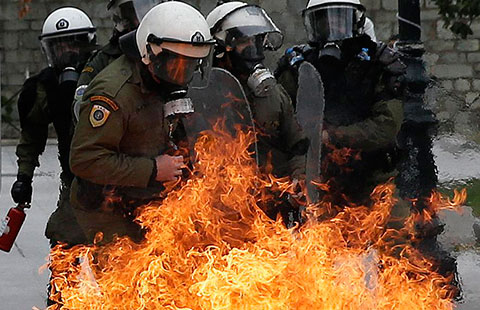

VLADIVOSTOK, Russia - As host of the upcoming Asia-Pacific Economic Cooperation (APEC) summit, Russia is expected to take APEC meetings as an opportunity to boost its influence in the Asia-Pacific region and further its "Look East" strategy.
As the world's largest country spanning both the European and Asian continents, Russia has more than 70 percent of its lands located in Asia. Thus, the Asia-Pacific region is of great strategic significance to Russia, whether in views of economic development, geopolitics or national security.
Moreover, compared with the crisis-hit Europe, the economies in the region have been steadily developed, creating a broad market for Russia, who heavily rely on exports of raw materials, especially gas and oil.
Since Europe has begun to promote its alternative routes of oil and gas bypassing Russia, rows between the two sides were often reported. The vigorous Asia-Pacific market was expected to replace Europe, a traditional energy market of Russia, to spur the development of Russia's export-oriented economy.
However, due to the lack of policy continuity and fund, development of Russia's Siberian region and the Far East region has been lagging behind for years, which became an obstacle to Russia's ambitious plan of modernization.
In July, Russian President Vladimir Putin said that Russia would continue to strengthen its position in the region, a rising new center of global development.
"Although the global crisis has affected this region, it continues to build up its economic power and has kept up its growth rate for the most part," Putin stressed.
"I believe that our participation in the integration processes underway in this region will boost socioeconomic growth in Siberia and Far East," he said.
Yuri Tavrovsky, a prominent political expert from Moscow Friendship University, told Xinhua that Russia would strengthen its links with "the East" after Putin's return to the Kremlin as president.
By utilizing the APEC summit, the remote Siberian and Far East regions would speed up their "Look East" and "Turn South" process, which was in line with the trends of globalization and localization, Tavrovsky said.
Along with its economic development, Russia is also seeking to expand its strategic space and safeguard its security in the eastern region by developing Far East.
With the expansion of the Europe Union and the deployment of the US missile defense shields in Europe, Russia is alarmed with shrinking of its strategic space in the western region.
Against such a backdrop, Russia is paying more attention to the Asia-Pacific region, which is considered as a breakthrough point to expand its strategic space.
Besides, with the return of the United States to the Asia-Pacific region and Japan's deliberately rearmament, Russia needs to mull over an answer to these potential threats and secure its geopolitical security in its eastern territory.
As one of the most influential political figure with strategic vision in Russia, Putin decided in 2006 to host the 2012 APEC meetings in the Far Eastern Vladivostok, a city of strategic significance but with poor infrastructure, 6,400 km east to Moscow.
The Russian government has allocated about 700 billion rubles (about $22 billion) to prepare for the event, despite protestors' claims of "blind construction" in such a sparsely populated remote region.
In May, Putin signed a presidential decree to establish the Ministry of Far East Development and appointed Viktor Ishayev, former special envoy to the region, as the minister.
In a recent interview with Xinhua, Ishayev said Russia has set an aim to coordinate efforts to push forward social and economic development in the region and build Far East as a Russian hub in the Asia-Pacific region.
It is foreseeable that Russia will be further involved in regional economic integration, enhance its coordination with APEC partners, and participate more actively in regional affairs.
However, to reach the goal, Russia has to pool money to revive the economy in the region under persistent political wills. Also, it has to take flexible economic measures and promote its ability on diplomatic balance.
Gleb Ivashentsov, deputy director of the Russian APEC Study Center, told Xinhua on the eve of the APEC meetings that Russia intended to demonstrate its huge growth potential in the Far East as well as its aspiration to integrate into the Asia-Pacific region by hosting the top-level gathering.
Fostering partnerships with APEC economies is a main priority for Russia, though the country "has still a long way to go," Ivashentsov said.















